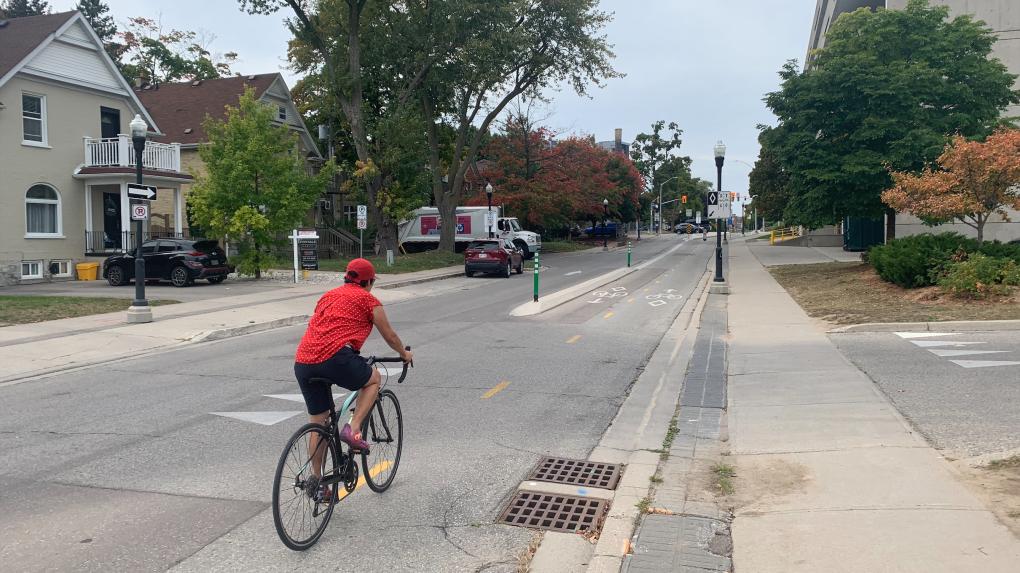Cycling advocates react to proposed bike lane restrictions requiring removal of traffic lanes
The provincial government is considering new rules to restrict a municipality’s ability to install new bike lanes if it means traffic lanes would be removed.
The proposal is expected be part of a gridlock reduction bill being tabled this fall.
Ontario’s Transportation Minister was asked about it on Friday morning.
“We examine a multitude of proposals when it comes to congestion management,” said Prabmeet Sarkaria. “Every [legislative] session that we get a chance we are looking at ways to make life easier for people and we are looking at ways to reduce gridlock in this province.”
Reaction in Waterloo Region
CTV News asked cycling advocates for their reaction and they expressed disappointment and skepticism over the proposal, saying the current setup is better for both cyclists and drivers.
“Having the separate infrastructure makes things safer for everyone,” said Janice Jim, vice-president of the advocacy group Cycle WR. “These cycling lanes are very well thought out. They’re planned years in advance. The cities are not just plopping one out overnight.”
She feels the decisions should be made locally.
“Cities and municipalities know their own streets best,” Jim said.
 Janice Jim from Cycle WR riding in the Joseph Street bike lane in Kitchener on Sept. 20, 2024. (Krista Simpson/CTV News)
Janice Jim from Cycle WR riding in the Joseph Street bike lane in Kitchener on Sept. 20, 2024. (Krista Simpson/CTV News)
Some experts say there’s no evidence that this bike lane proposal will have a positive impact on gridlock.
“This is a terrible idea that’s not based on any research or evidence,” said Brian Doucet, at the University of Waterloo’s school of planning. “It’s going to put lives at risk and it’s not going to solve congestion.”
He added that the root cause of congestion isn’t traffic lanes being turned into bike lanes.
“Across Canada and around the world, when we see safe, seamless and connected cycling infrastructure, we see that all mobility improves,” Doucet explained.
He believes the potential restriction is specifically aimed at Toronto traffic, though it’s unlikely to solve the city’s gridlock problem and wouldn’t address traffic troubles in Waterloo Region.
“If we look at the areas of worst traffic in our own community, they tend to be along the highways and they tend to be in areas where there are no bike lanes,” said Doucet.
Instead, he’d like to see the focus shift to improving public transportation options to Toronto so commuters have the option of leaving their cars at home.
CTVNews.ca Top Stories

Southern California wildfire destroys many structures; governor declares state of emergency
A wildfire whipped up by extreme winds swept through a Los Angeles hillside dotted with celebrity residences Tuesday, burning homes and forcing the evacuation of tens of thousands of people.
Trump is open to using 'economic force' to acquire Canada; Trudeau responds
Prime Minister Justin Trudeau said 'there isn’t a snowball’s chance in hell that Canada would become part of the United States,' on the same day U.S. president-elect Donald Trump declared that he’s open to using 'economic force' to acquire Canada.
A B.C. mom's real-life nightmare and the search to find her trafficked daughter
A Vancouver island mom shares the story of what happened to her teenaged daughter – and a warning for other parents about sex trafficking.
Liberal leadership hopeful Frank Baylis noncommittal on eliminating consumer carbon tax
Liberal leadership hopeful Frank Baylis says eliminating the consumer carbon tax alone will not 'solve the affordability issue for Canadians.'
Canadian naval vessel shadowed by Chinese war ship in the East China Sea
CTV National News is on board the HMCS Ottawa, embedded with Canadian Navy personnel and currently documenting their work in the East China Sea – a region where China is increasingly flexing its maritime muscle. This is the first of a series of dispatches from the ship.
Patient dies in waiting room at Winnipeg hospital
An investigation is underway after a patient waiting for care died in the waiting room at a Winnipeg hospital Tuesday morning.
Limit coffee-drinking to this time window to lower early death risk, study suggests
Drinking coffee has repeatedly been linked with better heart health and prolonged life. But the benefits of coffee consumption could depend on when you drink it, new research has found.
B.C. 'childbirth activist' charged with manslaughter after newborn's death
A British Columbia woman who was under investigation for offering unauthorized midwifery services is now charged with manslaughter following the death of a newborn baby early last year.
Man who exploded Tesla Cybertruck outside Trump hotel in Las Vegas used generative AI, police say
The highly decorated soldier who exploded a Tesla Cybertruck outside the Trump hotel in Las Vegas used generative AI including ChatGPT to help plan the attack, Las Vegas police said Tuesday.


































